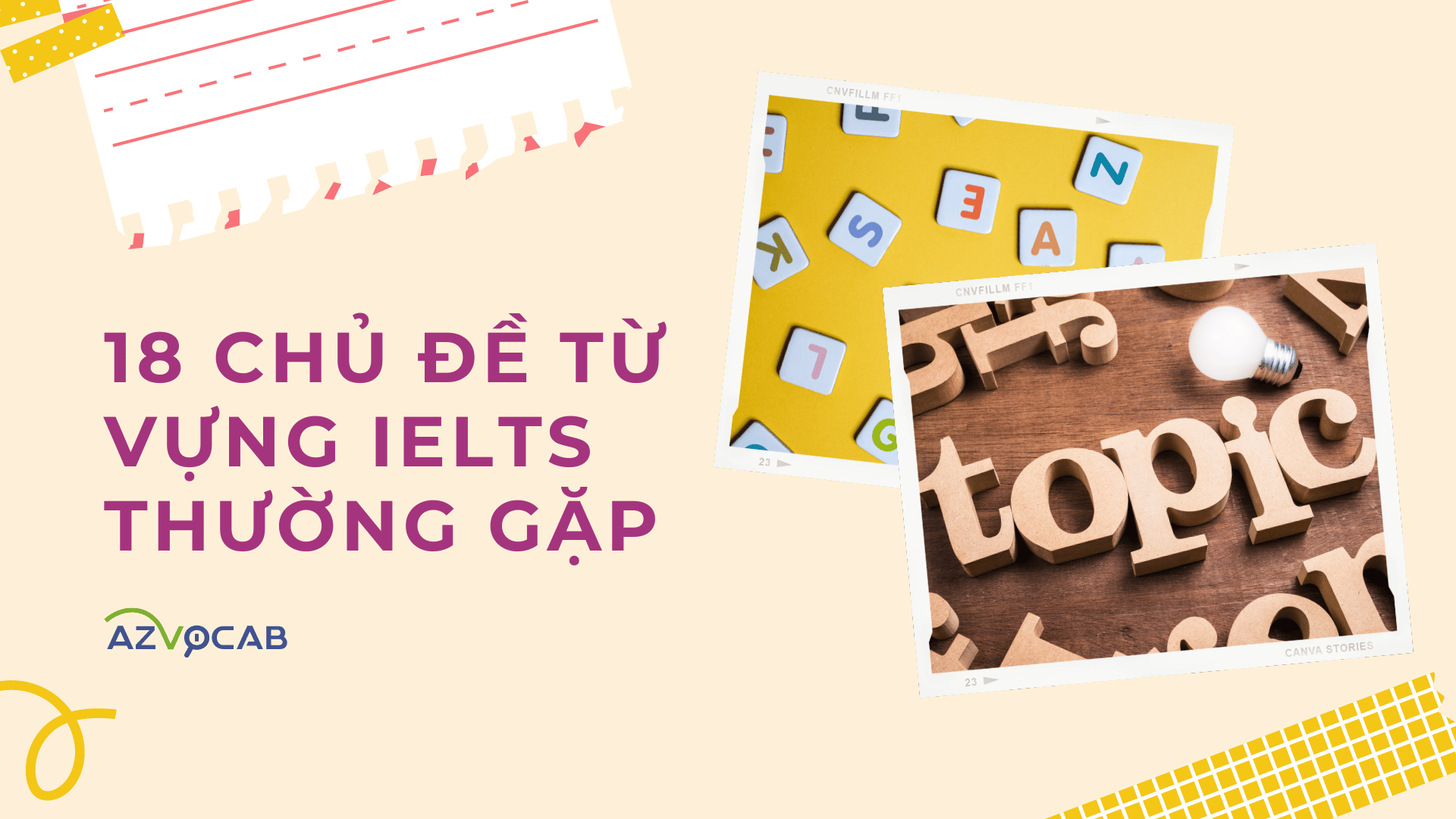200+ từ vựng chủ đề People & Relationships thông dụng cho kì thi IELTS

Từ những bộ sách hay nhất cho việc ôn thi IELTS, azVocab đã tổng hợp được hơn 200 từ vựng phổ biến nhất thuộc chủ đề People & Relationships cho kì thi IELTS.
Các từ vựng này đều có thể sử dụng cho cả 4 kỹ năng Reading, Listening, Speaking và Writing. Những ví dụ được azVocab lựa chọn kĩ lưỡng trong từng ngữ cảnh cụ thể ở các bài thi IELTS. Điều này sẽ giúp các bạn biết cách sử dụng từ trong ngữ cảnh, tăng tính hiệu quả của việc học từ.
1. Từ vựng Con người và sự phát triển
| Từ + nghĩa | Ví dụ |
| adolescence (n.) – thời niên thiếu | Between the ages of six and twelve, a child reaches what is termed ‘middle childhood’ and they will stay in this phase until they reach adolescence. |
| adolescent (n.) – thanh thiếu niên | In terms of their cognitive development, adolescents have greater reasoning skills and have developed the ability to think logically and hypothetically. |
| adulthood (n.) – tuổi trưởng thành | In adulthood, hedgehogs meet primarily to mate, producing litters of four or five hoglets as often as twice yearly. |
| childhood (n.) – tuổi thơ ấu | Studies have shown that stress in adulthood can be related to an unhappy childhood. |
| growth (n.) – sự lớn lên, trưởng thành | As far as physical milestones are concerned, during middle childhood, growth is steady but less rapid than during the pre-school years. |
| height (n.) – chiều cao | Within a year, boys and girls can gain an average of 4.1 inches and 3.5 inches in height respectively. |
| infancy (n.) – tuổi còn ẵm ngửa | This is also a period of enormous physical change and adolescents experience changes in their physical development at a rate unparalleled since infancy. |
| infant (n.) – trẻ sơ sinh | There was a significant increase in brain size from about 400,000 years ago, and this may correlate with increasing infant dependence. |
| maturity (n.) – sự trưởng thành, sự phát triển đầy đủ | Eyes will reach maturity in both size and function. |
| milestone (n.) – mốc quan trọng (trong đời ai) | In the first years of a child’s life, many important milestones are reached. |
| period (n.) – thời kì | The other participants had to periodically shift priorities, improving their skills in one area for a period of time while also maximising their success at the other tasks. |
| phase (n.) – giai đoạn, thời kỳ (phát triển, biến đổi) | This growth spurt typically occurs two years earlier for girls than for boys and can tend to make both sexes go through a clumsy phase. |
| rate (n.) – tốc độ | Stress causes the body to burn up calories at a faster than normal rate. |
| stage (n.) – giai đoạn | There are some major changes occurring at this stage as baby teeth will come out and permanent adult teeth wilt grow. |
| teenager (n.) – thiếu niên, tuổi teen | Adolescence is a period of transition for teenagers and there are many crucial milestones. |
| toddler (n.) – đứa bé mới biết đi | By the age of two or three. the infant has reached the toddler stage. |
| transition (n.) – sự chuyển tiếp | The final stage before adulthood is adolescence. This is a period of transition for teenagers and there are many crucial milestones. |
| welfare (n.) – đời sống sức khỏe và niềm hạnh phúc | The government has had to cut expenditures in most areas in order to fund the cost of borrowing and welfare. |
| fully-grown (adj.) – trưởng thành | The average height is rather below four feet, although many full-grown adults may be found who are very much smaller than this. |
| immature (adj.) – chưa trưởng thành, non nớt | Children in middle childhood seem very immature in terms of their emotional and social skills. |
| mature (adj.) – trưởng thành | My younger brother is very mature for his age. He doesn’t need my parents to help him with everything. |
| develop (v.) – phát triển | From birth, parents can nurture and help develop these social competencies by making eye contact with their babies, offering toys and playing with them. |
| endure (v.) – chịu đựng | Children who experience a rewarding friendship before the birth of o sibling are likely to have a better relationship with that brother or sister that endures throughout their childhood. |
| establish (v.) – hình thành | I have established a close connection with an older member of my family. |
| nurture (v.) – nuôi nấng, nuôi dưỡng | If we don’t nurture the artistic skills of young children, they are far less creative as adults. |
2. Từ vựng Con người và đặc điểm, tính chất, tính cách
| Từ + Nghĩa | Ví dụ |
| ability (n.) – năng lực | A ‘cognitively fluid’ mentality is an ability to link together information from different areas of our life. |
| behaviour (n.) – hành vi | We can potentially track language by looking at the behaviour of other animals. |
| character (n.) – tính cách | Within a tenth of a second of seeing an unfamiliar face, we have already made a judgement about its owner’s character – caring, trustworthy, aggressive, extrovert, competent and so on. |
| characteristic (n.) – đặc điểm, đặc tính | These yards sprang up either in or around many major cities in the nineteenth century but were particularly characteristic of London. |
| courage (n.) – lòng can đảm | Courage is not motivated by fearlessness, but by moral obligation. |
| instinct (n.) – bản năng | I don’t think just anyone can be a good parent. Not everyone has the right instincts. |
| memory (n.) – trí nhớ | Our memory prefers creating the past from the perspective of how relevant it is to our present situation. |
| mind (n.) – tâm trí | Our bodies and minds not only adapt to the surrounding world, but we actively shape and construct our environment to better suit our needs. |
| nature (n.) – bản chất | If you think that these transport problems can be solved by building more roads, you completely misunderstand the nature of the problem. |
| optimist (n.) – người lạc quan | Pete, ever the optimist, said things were bound to improve. |
| originality (n.) – tính độc đáo | I don’t like his style, but you have to admire the originality of his work. |
| pessimist (n.) – người bi quan | Pessimists point out that every attempt to change the council’s composition has failed. |
| resemblance (n.) – sự giống nhau, tương đồng | Everyone tells me that the physical resemblance between me and my maternal grandmother is very striking. |
| temperament (n.) – tính khí; khí chất | I think have my father’s temperament – we’re both very stubborn! |
| trait (n.) – nét tiêu biểu | Telling stories is a trait which is common to all nations. |
| abstract (adj.) – trừu tượng | Cognitive fluidity makes it possible for human beings to emerge from the concrete situational present and to adopt a more general and abstract approach. |
| apprehensive (adj.) – e sợ | We did not interview females, as they were not vocal and quite apprehensive of appearing before strangers. |
| assertive (adj.) – quả quyết, quyết đoán | If you really want the promotion, you’ll have to be more assertive. |
| clumsy (adj.) – vụng về | I’m always dropping things so some people think I’m a little bit too clumsy. |
| cognitive (adj.) – liên quan đến nhận thức; dựa trên hiểu biết, kinh nghiệm | When it comes to cognitive development, he will be able to find hidden objects easily and use objects correctly such as drinking from a cup. |
| consistent (adj.) – kiên định, nhất quán | Our results are consistent with some winners using their prize to take additional risks or buy luxury goods. |
| cooperative (adj.) – sẵn sàng hợp tác | The president said the visit would develop friendly and cooperative relations between the two countries. |
| cynical (adj.) – hoài nghi | Many people have become cynical about the stage-managed debates between politicians which regularly appear on television. |
| desirable (adj.) – đáng thèm muốn | Young people may not see popularity as a desirable trait. |
| eccentric (adj.) – lập dị, kì cục | Such originality as there consists of a variety of eccentric themes. |
| egotistical (adj.) – tự cao tự đại | He is portrayed as a handsome young man, but has a rather cocky and egotistical personality. |
| fond (adj.) – thích, yêu mến | I am fond of watching films at home, but I have to say that I prefer films in the cinema. |
| gullible (adj.) – khờ khạo, cả tin | There is any number of miracle cures on the market for people gullible enough to buy them. |
| idealised (adj.) – lý tưởng hóa | Popular students are not idealised in the way that popular culture sometimes portrays. |
| idealistic (adj.) – mơ mộng | Idealistic young people died for the cause. |
| inconsiderate (adj.) – thờ ơ, thiếu quan tâm | Our neighbours are very inconsiderate – they’re always playing loud music late at night. |
| indecisive (adj.) – do dự, lưỡng lự, không dứt khoát | We cannot be resolute in our remarks, but indecisive when it comes to taking action. |
| independent (adj.) – độc lập | He made my job quite difficult because he wasn’t independent at all. |
| irresponsible (adj.) – vô trách nhiệm | I think it’s irresponsible to carry on causing environmental damage that makes animals suffer. |
| materialistic (adj.) – duy vật; thực dụng | She is very materialistic. All she cares about is clothes and expensive cars. |
| patient (adj.) – kiên nhẫn | If you could just be patient for a few more minutes, someone will be with you shortly. |
| rebellious (adj.) – bất trị | Middle children, on the other hand, are more likely to be rebellious, perhaps in an attempt to define themselves as special’ in relation to their more conscientious elder siblings and agreeable younger siblings. |
| rewarding (adj.) – xứng đáng | I suppose the relationship I’ve found most difficult – but ultimately most rewarding – has been my relationship with my younger brother. |
| self-absorbed (adj.) – chỉ quan tâm đến bản thân | Henry is so self-absorbed it’s a miracle anyone bothers with him at all. |
| self-assured (adj.) – tự tin | The interview showed her as a self-assured and mature student. |
| self-centred (adj.) – tự cho mình là trung tâm | The self-centered man almost never admitted that he was wrong or made mistakes. |
| self-congratulatory (adj.) – tự khen | The winners gave themselves a self-congratulatory round of applause. |
| self-deprecating (adj.) – tự ti | Although he is always self-deprecating, he is a lawyer of considerable experience. |
| self-important (adj.) – tự cao | I look at these very serious, self-important people, and I just don’t want to be like that. |
| significant (adj.) – quan trọng | Today, tattoos are routinely seen on rock musicians, sports stars and other public figures who play a significant role in setting the culture’s behaviour patterns. |
| tactful (adj.) – lịch thiệp | They are tactful and attend to the face wants of their friends and themselves. |
| tolerant (adj.) – kiên nhẫn; khoan dung | If people were more tolerant of each other, then there would be less fighting. |
| well-adjusted (adj.) – thích nghi tốt, biết tự điều chỉnh | The school aims to produce well-adjusted members of society. |
| well-bred (adj.) – có giáo dục | She was too well-bred to want to hurt the little boy’s feelings. |
| well-brought-up (adj.) – được nuôi dạy tốt | Despite the family’s problems, the children were well brought up. |
| well-dressed (adj.) – ăn diện | Here is a well-dressed young man coming along the road with a large parcel. |
| express (v.) – bày tỏ, bộc lộ | By the age of two or three. the infant has reached the toddler stage. He has learned to take turns in games and spontaneously expresses affection. |
3. Từ vựng Con người và các mối quan hệ
| Từ + Nghĩa | Ví dụ |
| background (n.) – gia cảnh, bối cảnh gia đình | Our pupils came from a range of local, national, and international backgrounds. |
| bond (n.) – mối quan hệ (ràng buộc) | We used to fight a lot when we were growing up but there’s a really close bond between us now. |
| brotherhood (n.) – tình bằng hữu và sự trung thành | The more man knows of man, the better for the common brotherhood among us all. |
| conflict (n.) – mâu thuẫn | When used appropriately, understanding communication styles can help resolve conflict on teams. |
| connection (n.) – sự kết nối | I have established a close connection with an older member of my family. |
| fatherhood (n.) – sự làm cha | Fatherhood can develop many positive streaks in modern children. |
| friendship (n.) – tình bạn | When early friendships are successful, young children get the chance to master sophisticated social and emotional skills, even more than they do with a parent. |
| honeymoon (n.) – tuần trăng mật | After the festivities are over, the two sisters are dragged to their bedrooms and prepared by giggling bridesmaids for the first night of their honeymoons. |
| interaction (n.) – sự tương tác; sự ảnh hưởng lẫn nhau | Children who as preschoolers were able to coordinate play with a friend, manage conflicts, and keep an interaction positive in tone. |
| motherhood (n.) – sự làm mẹ | In order to secure support for their children, past women needed to present marriage and motherhood as public, not merely private concerns. |
| parents (n.) – cha mẹ | When parents relate to a child, they do a lot of the work, figuring out what the child needs and then accommodating those needs. |
| peers (n.) – người ngang hàng, người cùng địa vị, người đồng trang lứa | Socially and emotionally, teens worry that they may not be developing at the same rate as their peers. |
| relations (n.) – mối tương quan, liên hệ | Relations between the two countries steadily deteriorated. |
| relationship (n.) – mối quan hệ | Children who experience a rewarding friendship before the birth of a sibling are likely to have a better relationship with that brother or sister chat endures throughout their childhood. |
| relative (n.) – họ hàng | Sundry distant relatives, most of whom I hardly recognized, turned up for my brother’s wedding. |
| sibling (n.) – anh chị em | Children who had a positive relationship with a best friend before the birth of a sibling ultimately had a good relationship with their sibling that lasted throughout adolescence. |
| close (adj.) – gần gũi, thân thiết | There is a very close bond between a mother and a newborn baby. |
| close-knit (adj.) – gắn bó | We’re a very close-knit family. Even though we don’t live together any more, the family ties are still very strong. |
| maternal (adj.) – (thuộc) mẹ; của mẹ; về phía mẹ; bên ngoại | I think I have a very strong maternal instinct because I love taking care of small children. |
| parental (adj.) – (thuộc) cha mẹ | A baby by the end of the first year will enjoy imitating people and will also test parental responses to his behaviour. |
| interact (v.) – ảnh hưởng lẫn nhau, tác động | You can tell a lot by the way members of a family interact with each other. |
| relate (v.) – liên quan đến | When parents relate to a child, they do a lot of the work, figuring out what the child needs and then accommodating those needs. |
| satisfy (v.) – làm hài lòng, thỏa mãn | Curiosity is an important human trait, and many academic subjects allow people to satisfy this need. |
| inherit (v.) – kế thừa | Luckily, I inherited my father’s mathematical brain. |
Hy vọng nguồn tài liệu từ vựng trên đây sẽ giúp các bạn ôn tập thật tốt cho kì thi IELTS sắp tới của mình. Để học thêm từ vựng ở các chủ đề thông dụng khác trong kì thi IELTS, các bạn có thể tham khảo bài tổng hợp từ vựng IELTS theo 18 chủ đề thông dụng của azVocab. Chúc các bạn thành công chinh phục bài thi IELTS!





